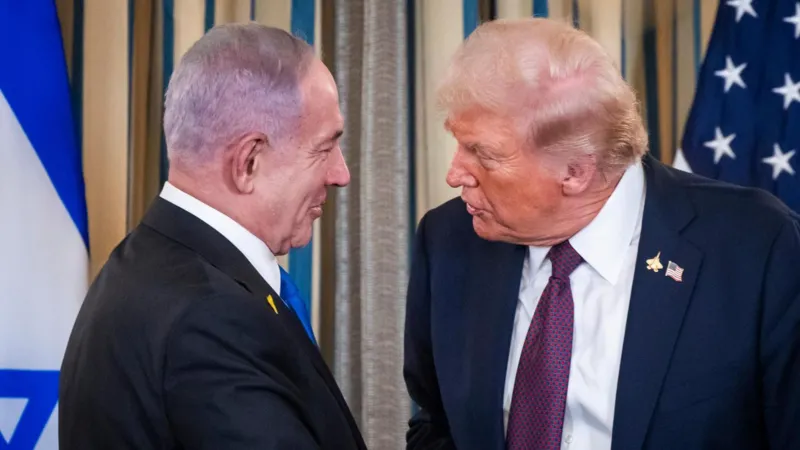Now Reading: Trump’s Gaza Peace Plan Gains Momentum but Faces Criticism Over Lack of Detail
-
01
Trump’s Gaza Peace Plan Gains Momentum but Faces Criticism Over Lack of Detail
Trump’s Gaza Peace Plan Gains Momentum but Faces Criticism Over Lack of Detail

Support grows across Middle East, but Netanyahu rejects two-state solution language
Donald Trump’s proposed framework to end the Gaza war and rebuild the devastated territory has sparked global attention, winning backing from key Arab states and Western allies — but it is already facing criticism for its ambiguity and lack of substance.
The plan, unveiled alongside Israeli Prime Minister Benjamin Netanyahu in Washington, has been endorsed by Jordan, Egypt, Saudi Arabia, Qatar, the UAE, Pakistan, Indonesia, Turkey, and several European powers. For the first time, Trump openly pressured Israel to back a roadmap that includes a nod — however vague — to the long-disputed two-state solution.
“Hamas has three to four days to decide,” Trump declared, warning that if the militant group rejects the offer, “the war goes on.”
Echoes of Biden’s Failed Attempt
The framework bears striking resemblance to a plan advanced by Joe Biden more than a year ago, which collapsed after Netanyahu, under pressure from his far-right coalition, shifted demands. Since then, Gaza has endured mass civilian casualties, famine conditions, and months of hostage suffering.
Unlike Biden’s proposal, Trump has infused his plan with personal momentum. Analysts suggest his forceful style makes him harder to resist, as seen when Ukraine’s Volodymyr Zelensky was humiliated in the Oval Office earlier this year.
Netanyahu’s Balancing Act
Despite standing beside Trump in Washington and voicing support in English, Netanyahu quickly rejected any notion of Palestinian statehood in Hebrew upon his return to Israel. “No, absolutely not. It’s not even written in the agreement. We will forcibly resist a Palestinian state,” he said.
This contradiction highlights the deep fractures in Israeli politics. Mainstream opposition parties cautiously back the plan, but Netanyahu’s far-right allies — including National Security Minister Itamar Ben Gvir — have condemned it as “dangerous” and “full of holes.”
An Ambiguous Framework
Trump’s document outlines a phased withdrawal of Israeli forces but leaves crucial details undefined, offering multiple opportunities for either side to stall or collapse negotiations. Critics say it reflects Trumpian diplomacy: bold declarations without the technical groundwork needed to hold a peace deal together.
Arab and Islamic foreign ministers have cautiously welcomed the plan, saying it could pave the way for full Israeli withdrawal and a just peace under a two-state solution consistent with international law. But Netanyahu insists no Palestinian right to the land exists, while Jewish extremists in his coalition still push for annexation of Gaza.
The result is a fragile blueprint with two competing interpretations: one envisioning eventual Palestinian self-determination, the other rejecting it outright. Both sides claim victory — but that ambiguity could prove fatal to Trump’s push for peace.




